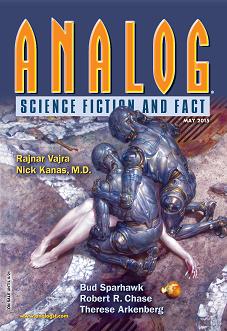 Analog, May 2015
Analog, May 2015
Reviewed by Louis West
This collection has a certain “proto-artistic” flavor to all the stories, like a painter sketching out the key elements of their work before bringing it to life. The ideas presented in each are interesting, sometimes compelling. However, the characters generally lack the inner-conflicted complexity I find necessary to generate the tension so essential to making a story great. As a result, I found this selection of stories a disappointment.
“Arnheim’s World,” by Therese Arkenberg, is about a recluse rich enough to afford his own terraformed world. He shares it exclusively with his childhood friend, Sara, and her spouse-to-be, Julia. Arnheim is thrilled with his world, but names nothing after himself. A nearby colony world’s terraforming efforts fail and the survivors escape. They call for help, but Arnheim wants nothing to do with them. It’s his world after all. Sara eventually invites the refuges to Arnheim’s world since he’d told her that anyone she invites would also be welcome. Arnheim shows the newcomers around then takes a scout ship and vanishes. Sara is sad that there is nothing to remind people of her good friend. A very low key story.
Robert R. Chase’s “Cetacean Dreams” follows a pod of dolphins and their human handler to Europa where it’s hoped that the dolphins can study the elusive Leviathan, a creature the scientists on Europa have been unable to study. Unfortunately, one of the dolphins attacks the Leviathan, but denies doing it afterward. Evidently, both people and dolphins suffer memory skips for several months after enduring the drug-induced hibernation trip from Earth to Europa. However, dolphins sleep by resting only one brain hemisphere at a time and, sometimes, an alternate personality emerges. After figuring this out, the mission proceeds and peacefully contacts the Leviathan, discovering a whole new form of communication and intelligence in the process.
A fun story with probable science and intriguing ideas. Some good tension as well after the dolphin attacks the Leviathan and it defends itself, almost destroying the human submersible in the process. Recommended.
“No Gain,” by Aubry Kae Andersen, follows Maggie, a gymnastics trainer who supervises the training for Sabina, a sixteen year-old Uzbek seeking to compete in the Olympics. Sabina seems unable to feel pain and drives herself relentlessly. Before she had a horrible accident and became hooked on pain meds, Maggie used to be a gymnastics star. She worries about her charge and, eventually, gathers the courage to raid the head coach’s records. There she discovers that Sabina is a chimera, genetically engineered to not feel pain. Offered a generous payoff for her silence, she is torn as to whether to take the money or report Sabina and her coach to the authorities for cheating. Evidently, without Sabina experiencing pain, Maggie isn’t sure Sabina deserves the titular gain of success.
I was seriously disappointed with the ending and felt the story could have been much more powerful. Maggie is also such a broken person that I had a hard time caring what happened to her.
J. L. Forrest’s “Sentience Signified” reads like an exobiologist’s wet-dream. The tale recounts vast details about the various life forms the survey team encounters, the team’s journey from Earth, their modified bio-printed bodies, their landing, their exploration of the planet, then, about halfway through, their discovery of sentient life. This, for me, is when the real story begins and the characters become interesting. First contact with a centaur-like creature means new beginnings for both sentient species.
The style of this story, however, is documentary, filled with tediously long passages about the team’s explorations and resultant findings. I think the story would have been much stronger with a more limited form of non-narrative POV. Interesting but not compelling.
“Slider” by Bud Sparhawk is about a man’s attempts to get his talented son to lead the dream baseball life that he’d failed to achieve for himself. When his son is offered a major-league contract plus all the physical and genetic enhancements to ensure he can sustain peak performance for many years, the main character is thrilled. However, he’s also unwilling to let anything get in the way of that dream, even his son’s feelings about the long-term costs to his own health and how much of life he would miss out on. Somewhat interesting, but I hated that the main character was an asshole about it all and never came to realize what he was doing.
In Rajnar Vajra’s “Zen Angel,” Len is an immortal, or at least over three centuries old and constantly regenerating. He also cycles back and forth through puberty, sometimes losing memories and even switching genders every eighty years or so. It sucks. Then the government sniffs him out and recruits him for a mission, which they won’t tell him about. However, it’s the doctor screening him for the mission who intentionally lets slip that the government doesn’t want Len returning alive.
An attempt is made on Len’s life several times by creatures straight out of nightmares. Government security whisks him away where he eventually meets an enormous alien specifically looking for him to represent humanity in a cross-species contest. Evidently, these aliens, called the Vine, discovered an artifact from an earlier universe offering to share ancient technologies with the properly worthy races. Len agrees and is teleported to another star system where he is prepared for, then engages in, several challenges. Success seems assured, until another race attacks, trying to kill the Vine and take the new tech for themselves. In the end, Len is left with a gift from the ancient aliens, but he has no idea what it is. The end.
The style of writing is fairly tongue-in-cheek sarcasm and humor. Consequently, I never sensed any real tension in the story or genuine risk to Len’s life. While all the aliens were intriguingly described, it read more like a travelogue with no proper end. It just stopped. Very disappointed.